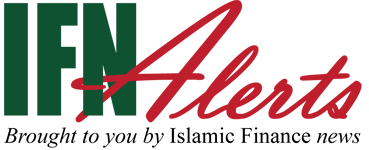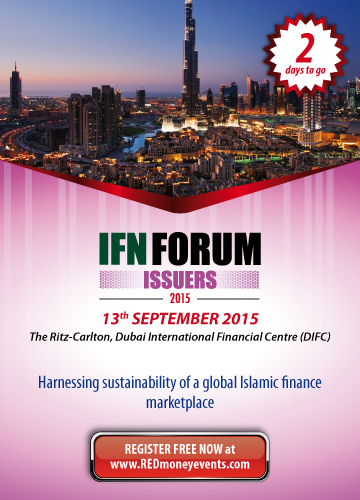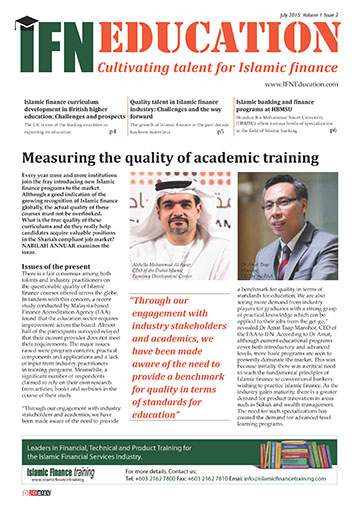LUXEMBOURG: European
leaders, decision-makers, practitioners and regulators came together this
week in a united drive to define, develop and diffuse Islamic financial
values and practices throughout the region. Over 250 delegates from more
than 15 countries met at the IFN Europe Forum held at the Chamber of
Commerce in Luxembourg, in an event that was unique in its positivity and
enthusiasm for the opportunities that Islamic finance can offer not only
its core market, but the wider community.
Finance minister Pierre Gramegna highlighted the strides forward that both
Luxembourg itself and the wider European community have taken in the past
12 months, focusing not only on the opportunities in the investment
management and private banking arena; but retail banking, commercial
opportunities and corporate Sukuk, among others – and these were areas
keenly debated during the event, with panels looking at topics such as ‘Key
Growth Markets for Islamic Finance in Europe’, ‘Trends in European Asset
Management’, ‘New Assets and Structures in Shariah Compliant Capital
Financing’, and much more.
The industry has undoubtedly been propelled forward by the inaugural
sovereign issuances last year from both the UK and Luxembourg, and Minister
Gramegna also confirmed Luxembourg’s intention to return to the Sukuk
market in 2016 with potentially a new and innovative asset structure.
Players highlighted the strong support that these issuances have given the
industry. “Europe introducing two sovereign Sukuk is materially important
for investors like us,” said Alex Armstrong, the managing director of
QInvest. “Now, Sukuk is relatively common parlance within Europe – and
that’s hugely helpful for a GCC investor trying to deploy capital in the
region.”
The launch of continental Europe’s first Islamic bank, set for the 1st July
by Kuveyt Turk subsidiary KT Turk, should go a long way towards not only
meeting but developing Muslim demand in the region, and chief
representative Ugurlu Soylu told IFN exclusively that the bank, which is
launching with EUR35 million (US$39.56 million) in capital, received over
1,000 enquiries in the first week and expects to see between EUR20-30
million (US$22.6-33.91 million) in retail deposits, with the very real
intention of a EUR100 million (US$113.02 million) Sukuk within its first
two years of operation.
Socially responsible investing (SRI), alternative finance (crowdfunding)
and social entrepreneurship were hot topics, and here the emphasis was on
the opportunity for ethical and Islamic finance to learn from, support and
expand each other. “It is not that Islamic finance can teach us how to do
SRI, it is the other way round. If we want to succeed we have to offer
better products and top the existing standards, and this is an interesting
challenge. SRI is more sophisticated in the conventional industry and we
should learn from that,” said Dr Volker Nienhaus, a visiting professor at
the Henley School of Business, Reading University, UK.
Property was of course another focus, and one trend for Europe could be a
proliferation of new REIT launches, as high-level discussions for a
cross-border REIT structure in Luxembourg look set to attract more Islamic
investors. “Big tax developments in several European countries are
upsetting the traditional way of investing in property, so we should see
more alternative avenues such as REITs,” confirmed one panelist. This is
indicative of a wider trend of international Islamic investors looking further
afield for returns, and the European industry is keen to capitalize on
that. “If I want to obtain [a] higher yield in a risk framework I’m
comfortable with, I have to look to wider geographical markets,” said
another delegate.
However, there are undeniable challenges that remain in the European market
– not least those of positioning, education and branding. “It’s the quality
of the product. In developed Islamic markets where clients can
differentiate between the technical attributes of the product, and Islamic
products can come very close to conventional. In Europe, clients are
perhaps not so well disposed towards the word Islamic, so we need to
differentiate it through quality,” said one delegate. And it’s not only the
investor awareness that is the issue. “Education on consumer sentiment is
one thing, but it is also the education of regulators,” warned another.
Nevertheless, the overall sentiment is one of support, positivity and
enthusiasm for the future: with an exceptionally diverse spread of delegates
from both the Islamic and conventional sectors demonstrating the keen
interest that continues to flourish in the European market.
|











No comments:
Post a Comment
Note: Only a member of this blog may post a comment.